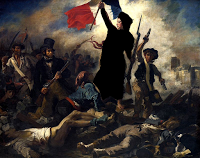 A common item of discussion on this blog is the role of what has been called the Arab Spring. One of the problems with evaluating the Arab Spring is that most Americans view it through the prism of American history, notably the American Revolution. This leads certain people to see similarities to the American revolutionaries at the start of it and thus predict that its result will be Arab governance of the Arab people, by the Arab people, for the Arab people, with the Arab people becoming disposed to constitutional liberalism. The counter view starts with what form the new regime took and concludes that the whole thing is a dangerous development.
A common item of discussion on this blog is the role of what has been called the Arab Spring. One of the problems with evaluating the Arab Spring is that most Americans view it through the prism of American history, notably the American Revolution. This leads certain people to see similarities to the American revolutionaries at the start of it and thus predict that its result will be Arab governance of the Arab people, by the Arab people, for the Arab people, with the Arab people becoming disposed to constitutional liberalism. The counter view starts with what form the new regime took and concludes that the whole thing is a dangerous development.I would like to suggest an alternate prism for evaluating the Arab Spring, that of the French revolutions, and I do mean that in the plural. To summarize, the first French Revolution, the most famous of them, started with the same ideals as the American Revolution, encapsulated in the motto, "Liberté, Egalité, Fraternité." However, after the 1790 revolutionaries succeeded in effecting regime change, the nouveau regime quickly devolved into the Reign of Terror which gave way to Napoleon and the First Empire early in the 19th century. The First Empire ended with military defeat at Waterloo with the allies subsequently reinstituting the Bourbon monarchy. There was a second attempt to institute a republic in France with the July Revolution of 1830, which only succeeded in changing the ruling dynasty within the monarchical system. This was followed by the June Rebellion of 1832, which constituted much of Les Misérables, which was squashed within two days. The Republic was finally restored by the 1848 Revolution which installed Louis-Napoléon Bonaparte as president. However, that republic was short-lived as Louis-Napoléon installed himself as emperor Napoléon III over the Second Empire. It wasn't until 1870, more than 80 years after the first revolution that was supposed to create a republic, that France finally instituted a republic with any longevity.
I know less about when the social order of France changed from something much like what predominates in the Arab world today, where there is a small elite that lives well while everyone else lives in abject poverty, to the more egalitarian society that exists in France now. What I do know is that in both today's Arab Spring and the French revolutions and rebellions the stark contrast between the privileged elite and the masses contributed to the unrest, and that the revolutions spawned by widespread misery did not bring about a quick end to the misery.
What this framework brings to the forefront is that there is a long-term and a short-term way to evaluate the Arab Spring. The final word on the long-term will have to wait until it happens. However, it does suggest that dismissing the notion of an Arab republic ruling a constitutionally liberal polity based on current events in the Arab Spring would be like dismissing the notion of a stable French republic based on the Reign of Terror. However, in the short-term, we have to deal with the regimes that were created today by the Arab Spring, particularly the regime that was created in Egypt. For the small number of liberals in Egypt, there is probably widespread identification with Gavroche's lines:
There was a time we killed the kingIn a way, we're all living with a world that will not make the changes we would like as quickly as we would like. Sometimes we will think we are promoting "Liberté, liberté cherie (liberty, cherished liberty)," but those providing the manpower for the change think more of "Qu'un sang impur, Abreuve nos sillons (let an impure blood water our furrows)."
We tried to change the world too fast.
Now we have got another king
He is no better than the last.
In the short run, our task must be to learn to be wary of those whose lofty rhetoric reminds us of Thomas Jefferson and be alert that such a person may have as much in common with Napoléon III. For the long term, instilling constitutional liberalism in the Arab world will require social change in their societies. While claiming that any particular action will have such a result is clearly non-sense, it is almost as clear that certain other actions will prevent such change. One such action is imposing a regime on the people that serves western interests rather than the interests of those they rule. In that sense, while the change from Mubarak to the Muslim Brotherhood was a clear step back for western interests, and the subsequent change to al-Sisi be still be a net negative from Mubarak, the cost of imposing the Mubarak regime on the Egyptian people must also be factored in to the assessment of the Arab Spring.
